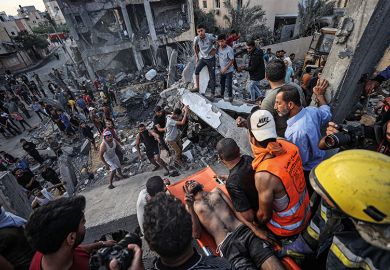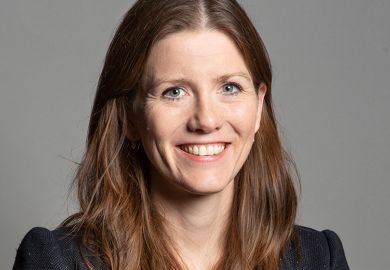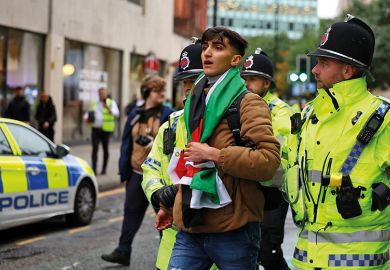Israeli universities have suspended scores of Palestinian students amid reports of mob violence, while lecturers criticising the country’s bombardment of Gaza are left fearing that they could lose their positions.
With public anger directed at Palestinians in the aftermath of the Hamas killings earlier this month, non-Jewish students at Israeli institutions are facing the brunt of hatred, researchers said.
More than 100 Palestinian students from at least 25 universities have been told to suspend their studies, according to the academics and lawyers working to support them.
Adi Mansour, a civil rights lawyer in the Adalah Legal Centre for Arab Minority Rights in Israel, said that since 7 October there had been a marked shift in punitive actions taken by Israeli universities.
“Almost all the requests are for the suspension of students,” he said. “This describes the intent of these procedures, but also the amount of the revenge that’s being put on the shoulders of these students at a very emotional time – in a way that is very removed from any legal procedure.”
Mr Mansour said he and colleagues had been working long shifts trying to defend students, with the overwhelming majority of cases not adhering to any legal grounds.
“What we’re seeing now is that academic institutions are perceiving their authority in a very different way,” he noted, adding that in many cases, universities have been looking to students’ social media posts as evidence of their alleged anti-Israel views, with some even citing Facebook posts made years ago.
The British Society for Middle Eastern Studies (Brismes), which is based out of the London School of Economics and has been monitoring threatening messages to Palestinian citizens of Israel, reported numerous instances of Palestinian students and faculty being branded as “enemies” in Hebrew social media and Telegram groups.
Public anger has led to increasingly radical reactions directed at those inside universities.
At Netanya Academic College on 28 October, a mob attacked a dormitory housing Arab students, with footage showing men chanting “death to Arabs”.
On 16 October, the chair of the National Union of Israeli Students issued a letter supporting the removal of Palestinian students from universities and colleges.
A petition signed by more than 10,000 people has called for the “immediate dismissal” of 25 faculty members at Haifa University who urged the university to reconsider its suspension of Palestinian students for their alleged support of Hamas – a decision the scholars say was made without proper evidence, in violation of university regulations and civil law.
Already, at least three academics – Arab and Jewish – have been suspended from their positions for having expressed sympathy with people in Gaza or for having criticised Israel’s actions in the strip, with reports of more receiving warnings or being asked to step down from their institutions, scholars said.
In letters sent to 26 heads of Israeli universities and colleges, Brismes expresses concern about the treatment of Palestinians on Israeli campuses and urges the institutional leaders to protect freedom of speech and to fulfil their “duty of care” to the Palestinian students in their charge.
“It is precisely during times of war that academic freedom and freedom of expression are tested and need to be assiduously and robustly protected,” wrote Brismes vice-president Neve Gordon, a professor of international law and human rights at Queen Mary University of London.
Reactions, though, have not been receptive, said Anat Matar, a senior lecturer in philosophy at Tel Aviv University and a member of the group Academia for Equality.
“Unanimously, the responses of these presidents is hostile. They either ignore us or react with sheer contempt,” she said.
Meanwhile, the situation for Palestinian academics continues to look more bleak.
One Palestinian lecturer, who requested anonymity because of fear for her job and her personal safety, said the room for those of Palestinian identity to participate in the public discourse was rapidly shrinking.
“As a Palestinian, I can and I do refuse any terms of what Hamas did. And I say it loudly wherever I am,” she said. “But if I say that and also sympathise with victims, the 6,000 Palestinians and 1,000 Israelis killed,” this risked prompting outrage – with potentially disastrous career repercussions.
While Palestinian lecturers have long been vulnerable, the climate of fear now – both at work and at home – is worse than before.
Dr Matar expressed deep concern for her Palestinian colleagues and students amid growing radicalisation. While Israeli universities are now closed, with the start to the semester postponed, she worried about what might happen when they return to face-to-face learning.
“I think this is very dangerous,” she said. “I’m not sure what’s going to happen when we come back to campus.”
Register to continue
Why register?
- Registration is free and only takes a moment
- Once registered, you can read 3 articles a month
- Sign up for our newsletter
Subscribe
Or subscribe for unlimited access to:
- Unlimited access to news, views, insights & reviews
- Digital editions
- Digital access to THE’s university and college rankings analysis
Already registered or a current subscriber?








